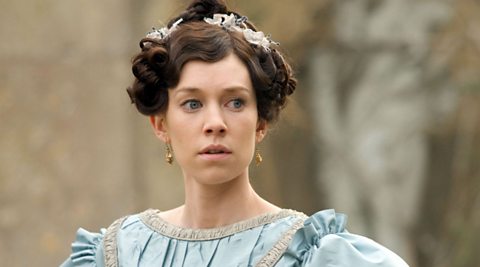Use of language in Great Expectations
Language refers to the choices of style and vocabulary made by the author. When analysing the language Dickens uses you should think about:
- What? The author's choice of specific words and literary deviceAny method an author uses to add meaning or interest to a text, such as metaphors, similes or alliteration..
- Where/how? The way in which the author uses them.
- Why? The effect on the reader.
Charles Dickens makes very specific use of language to help us understand and appreciate the plot, character and themes of Great Expectations.
Evidence and explanation of the language used
Here are some examples of language choices which Dickens makes. Let's concentrate on character names and literary devices such as animal imageryThe use of language to create images and pictures in the reader's mind..
1. Words – character names
How does Dickens use character names?

Dickens chooses the names of his characters with care. For instance:
- Pip – a pip is a small seed that grows into something more substantial
- Estella – means star; which is both glittering and inviting, yet cold and remote
- Jaggers – sounds harsh or biting
- Magwitch – sounds sinister; it is a combination of 'magic' and 'witch'
In some cases the sound of the name gives us an idea about the personality or appearance of the character. In these instances Dickens is using a technique called onomatopoeiaThe sounds of words to express or underline their meaning, eg 'crunch', 'pop'..
Why does Dickens use names in this way?
Dickens wants the sound of his characters' names to reflect their personalities and to give an immediate idea of what they are like. So:
- names like Pumblechook or Wopsle sound silly and so immediately show how ridiculous we are supposed to find these characters
- Joe might remind us of Joseph, the father figure in the story of Jesus in the Bible
- the Pocket family are summed up by their surname and this adds to the theme of wealth which runs through the book
Dickens was famous for creating these unusual characters. So much so, that if a character from any novel has a name that reflects their personality it is said to be 'Dickensian'.
2. Literary devices – animal images
Imagery
Imagery is the general term covering the use of literary devices which encourage us to form a mental picture in our mind about the way something or someone looks, sounds, behaves, etc. The language used often relates to one or more of our five senses.
The two most common literary devices which come under this heading are simileA comparison using 'like' or 'as' to create a vivid image, eg as big as a whale; float like a butterfly, sting like a bee. and metaphorA comparison made without using 'like' or 'as', eg 'sea of troubles' and 'drowning in debt'..
Where and how does Dickens use animal imagery in Great Expectations?
Images of animals appear throughout the novel, forming a deliberate pattern. For instance:
- Miss Havisham's house is infested with mice, spiders, beetles and other wildlife associated with death and decay
- Bentley Drummle's nickname is 'the Spider', indicating his dangerous and sneaky nature
- Pip thinks of the prison ship as 'a wicked Noah's ark' – ie the prisoners are kept in horrible conditions like animals
When Magwitch is eating he is compared to a large dog, messy but powerful. Later when Pip eats food provided by Estella, he too feels like a dog. This image connects the two characters.
Why does Dickens use animal imagery in this way?
Dickens uses animal imagery about his characters when he wants to get the reader to understand:
- something about a character's appearance
- something about a character's personality
For example:
Mr Pumblechook is described as having 'a mouth like a fish'. This simile helps us to understand that his mouth is large and opens and closes in a comical fashion.
He is also described as 'a windy donkey'. This metaphor tells us that he is stubborn and has too much to say for himself.
Sometimes the two approaches are combined:
When Joe meets Miss Havisham he is described as 'like some extraordinary bird; standing as he did speechless, with his tuft of feathers ruffled, and his mouth open as if he wanted a worm.' This emphasises how shocked and out of place Joe is at this point.